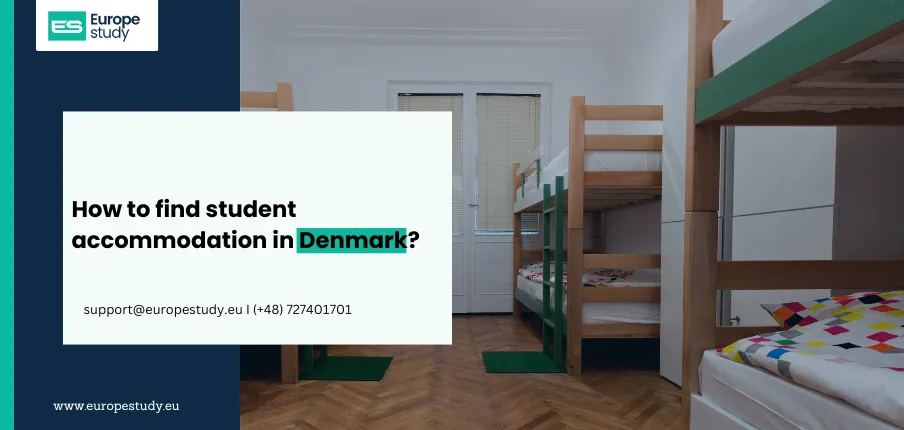
How to find student accommodation in Denmark?
Finding accommodation as a student in Denmark can be one of the most challenging parts of relocating to study. With Denmark’s high-quality education system and growing popularity among international students, housing—especially in major cities like Copenhagen, Aarhus, and Odense—can be competitive.
This guide walks you through the different types of student accommodation in Denmark, how to apply, what to expect in terms of pricing, and key tips for securing housing.
Why Student Housing in Denmark Requires Early Planning
Denmark does not have a centralized system that guarantees housing for all students, particularly international students. While many universities offer support or guidance, it is often up to students to find their own accommodation. Demand can be high, especially around August and September when the academic year starts.
Types of Student Accommodation in Denmark
1. Student Halls of Residence (Kollegier)
- What are they?
These are shared housing facilities specifically for students. You may have a private room and bathroom, but typically share kitchens and common areas. - How to apply:
- Some universities have agreements with local kollegier and can help you apply.
- You can also apply independently via websites like:
- www.kollegierneskontor.dk (Copenhagen)
- www.studenthousingaarhus.com (Aarhus)
- Pros: Affordable, social atmosphere, often located near universities
- Cons: High demand, long waiting lists, and limited availability in English-language portals
2. Private Rented Rooms or Apartments
- What are they?
Renting a room in a shared flat (called a “kollektiv”) or a private apartment from a landlord or local student. - Where to search:
- BoligPortal.dk
- Lejebolig.dk
- HousingAnywhere.com
- University Facebook groups and expat forums
- Pros: More independence and variety of options
- Cons: Higher costs and risk of scams if not careful
3. University-Managed Housing
- Some Danish universities offer a limited number of university-arranged rooms or flats for international students, particularly for exchange or full-degree students. These are usually applied for when you accept your admission offer.
- Examples:
- University of Copenhagen – Housing Foundation Copenhagen
- Aarhus University – AU Housing
- DTU – Accommodation Office
- Tip: Apply as early as possible, as spaces are limited and allocated on a first-come, first-served basis.
Average Cost of Student Accommodation
The cost of student housing in Denmark varies depending on the city and housing type:
|
City |
Type |
Monthly Rent (DKK) |
|
Copenhagen |
Shared room in kollegium |
3,000 – 4,500 |
|
Aarhus |
Shared student apartment |
2,500 – 4,000 |
|
Odense |
Private room in shared flat |
2,000 – 3,500 |
|
Aalborg |
Studio apartment |
3,500 – 5,500 |
Note: These prices may not include utilities (electricity, water, internet).
Documents You May Need
When applying for accommodation, especially through private landlords, you may be asked for:
- Proof of university admission
- A valid passport or ID
- CPR number (Danish personal identification number) if you already have one
- References or guarantor (for private rentals)
Tips for Finding Accommodation in Denmark
- Start early: Begin searching as soon as you receive your admission letter—ideally 3–5 months before your program starts.
- Be flexible: Consider living further from campus or in nearby towns with good public transport links.
- Watch out for scams: Never send money before seeing a lease contract or verifying the landlord. Use secure platforms or university-recommended services.
- Use university resources: Many universities have housing departments or support services for international students. Some even host webinars or info sessions before the semester begins.
- Join student groups: Facebook groups like “International Students in Copenhagen” or “Aarhus Student Housing” often have peer-to-peer offers and advice.
What to Expect After Arrival
Once you find housing and move in, make sure to:
- Register your address with the local municipality to get your CPR number (essential for accessing health care, opening a bank account, etc.)
- Set up your utilities and internet (if not included)
- Get familiar with Danish tenancy laws and your lease rights
Conclusion
Finding student accommodation in Denmark can be competitive, especially in major cities. But with the right preparation, trusted platforms, and early action, you can secure housing that’s comfortable, affordable, and conveniently located.
Make housing a priority as soon as you're accepted to a Danish university, and use both official channels and student networks to explore your options. The earlier you start, the better your chances of finding the right place.





